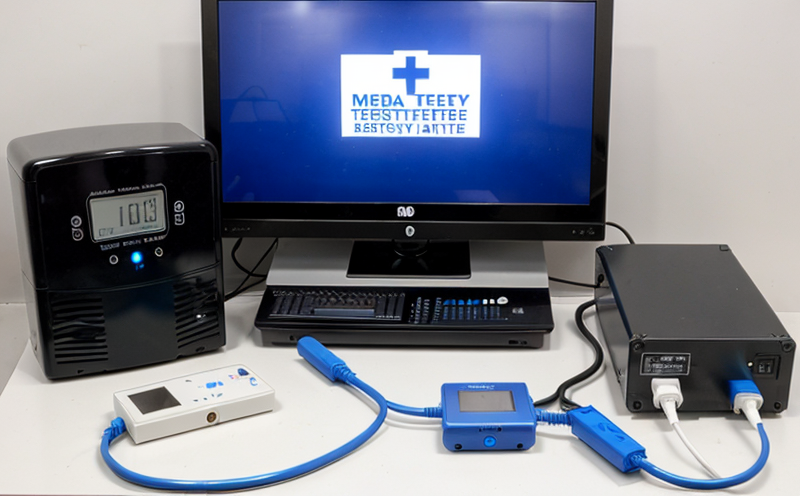UL 2054 Medical Device Household and Commercial Battery Testing
The UL 2054 standard establishes safety requirements specifically for medical device batteries used in household and commercial applications. This testing is critical to ensure the battery's safety, performance, and compatibility with other devices within a medical setting. At Eurolab, we provide comprehensive testing services that meet or exceed these standards.
Our UL 2054 compliance testing covers a wide range of tests including, but not limited to, high-temperature storage, low-temperature cycling, vibration resistance, and short-circuit protection. These tests are designed to assess the battery's ability to withstand various environmental conditions it might encounter in use.
The UL 2054 standard is particularly important for ensuring that batteries used in medical devices do not pose a risk of overheating or fire, which could lead to severe patient harm. For instance, in a home-use defibrillator, the battery must be reliable and safe under all expected conditions. Our testing ensures that these requirements are met.
Additionally, we perform compatibility tests to ensure that the batteries function correctly when paired with other components of the medical device. This includes checking for any interference or malfunction that could arise from interaction between different parts of a system. Compatibility issues can be particularly problematic in complex devices like insulin pumps or pacemakers, where multiple subsystems depend on each other.
Our testing facilities are equipped with state-of-the-art instrumentation capable of simulating real-world conditions to the highest degree of accuracy. This allows us to provide precise and reliable test results that are crucial for meeting regulatory requirements and ensuring product safety.
The process typically begins with a thorough review of the design specifications provided by our clients. This helps us tailor the testing to meet their specific needs, whether it's focusing on particular aspects like high-temperature performance or low-voltage operation. Once the plan is established, we proceed with specimen preparation, which involves charging and discharging batteries according to prescribed protocols.
Testing can last several weeks depending on the complexity of the battery and the number of parameters being evaluated. During this time, our experts monitor every aspect of the test to ensure accuracy and consistency. After completion, detailed reports are generated summarizing all findings along with recommendations for improvement if necessary.
To sum up, UL 2054 testing is a vital step in ensuring that medical device batteries meet stringent safety standards before they reach market or clinical use. By partnering with Eurolab, our clients gain access to expert knowledge and cutting-edge technology dedicated solely towards achieving compliance with this important standard.
Eurolab Advantages
At Eurolab, we pride ourselves on offering unparalleled expertise in the field of medical device battery testing. Our team comprises highly qualified professionals who understand not just the technical aspects but also the regulatory landscape surrounding this area. This unique combination allows us to provide tailored solutions that address each client's specific challenges.
- Comprehensive Coverage: We cover all relevant sections of UL 2054, ensuring no stone is left unturned during testing.
- Up-to-Date Knowledge: Our staff stays abreast of any changes in the standard or industry trends so that we can offer insights and recommendations based on current best practices.
- Prompt Reporting: Results are provided swiftly after testing is completed, allowing you to make informed decisions quickly.
- Cost-Effective Solutions: By avoiding unnecessary expenses through efficient planning and execution of tests, we help keep costs down without compromising on quality.
- Confidentiality: We understand that some information needs protection. Therefore, all communication regarding your projects remains strictly confidential.
Choose Eurolab for your UL 2054 compliance testing and experience the difference in professional service and commitment to excellence.
Quality and Reliability Assurance
- High-Temperature Storage: Testing batteries under extreme heat conditions to ensure they do not degrade or pose a safety hazard.
- Vibration Resistance: Ensuring the battery remains stable during transportation and use in environments subject to vibration.
- Low-Temperature Cycling: Simulating cold weather conditions where the battery must still function properly.
- Short-Circuit Protection: Checking that the battery can safely handle short circuits without malfunctioning or causing damage.
In addition to these physical tests, we also conduct electrical performance checks which include measuring internal resistance and voltage levels throughout the lifecycle of the battery. These measurements are crucial in determining how well the battery will perform over time under actual usage conditions.
We use internationally recognized standards such as UL 2054, ISO/IEC 17025, ASTM E691, and others to guide our testing procedures. By adhering strictly to these guidelines, we ensure that our results are both accurate and reliable, providing you with confidence in the safety of your products.
Our stringent quality control measures extend beyond just laboratory tests. We also conduct field trials whenever possible, allowing us to gather additional data points that reflect real-world performance scenarios more accurately than purely controlled environments could do alone.
Environmental and Sustainability Contributions
In today's world, sustainability is increasingly becoming a key consideration in product development. At Eurolab, we recognize this trend and strive to incorporate sustainable practices into our operations wherever possible. One way we contribute towards environmental sustainability is by minimizing waste during testing processes.
We employ advanced recycling technologies that allow us to reuse parts of used batteries for further analysis instead of discarding them entirely after one round of tests. This not only reduces landfill contributions but also helps reduce the overall carbon footprint associated with manufacturing new batteries from scratch.
Another aspect where we contribute positively is through energy efficiency improvements in our laboratories. By optimizing our equipment usage and implementing efficient cooling systems, we significantly decrease our electricity consumption without affecting test outcomes negatively. These efforts reflect a broader commitment to corporate social responsibility.
Lastly, by helping our clients achieve UL 2054 compliance, we play an instrumental role in promoting safer products that can be used confidently across various environments including homes and hospitals. Safer devices mean fewer accidents, better patient care, and ultimately contribute positively towards public health outcomes globally.





